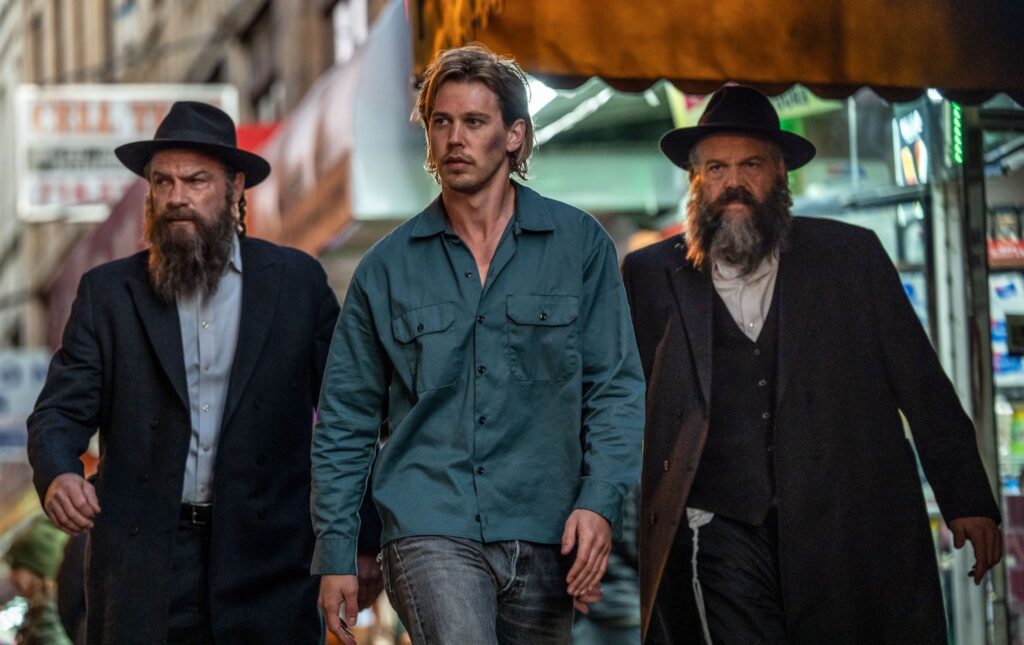In Darren Aronofsky’s “Caught Stealing,” Hank (Austin Butler) vomits on a window pane, pisses himself after being pummeled by Russian gangsters, and loses a kidney—a series of ordeals that leads Lipa (Liev Schreiber) to wisely observe that Hank “has the suffering of the spirit.”
Grandiloquent but accurate, Lipa’s diagnosis could apply to any Aronofsky protagonist. His characters have myriad professions (they are ballerinas, conquistadors, and maternal deities), but above all, they are sufferers, praying that their poetic agony will end in ecstatic catharsis.
That prayer is greeted with empty answers in “Caught Stealing,” Aronofsky’s attempt to import his signature spiritual anguish into a circa-1998 Lower East Side crime odyssey—a pitiful stab at frisky fun from a director who’s at his most exuberant when he’s frolicking in the dark.
“I had so much,” Hank moans. “It was right here.” Just as Hank let baseball stardom slip away, Aronofsky has wasted the momentum he gained from “The Whale” (2022), which starred Brendan Fraser as Charlie, a dying English teacher capable of intoxicating candor.
“College doesn’t matter,” Charlie declares, casting his laptop aside as the film nears its climax. A sublimely symphonic flourish, that scene confirmed that Aronofsky was still the 37-year-old punk who directed “The Fountain” (2006), the melodic, psychedelic romance that remains his most transcendent creation.
While “The Fountain” was about a husband and wife (Hugh Jackman and Aronofsky’s ex-partner, Rachel Weisz) reckoning with their mortality, “Caught Stealing” (which screenwriter Charlie Huston adapted from his 2004 novel) dutifully tallies the misadventures of a more casual couple, Hank and Yvonne (Zoë Kravitz).
“I don’t want to be with somebody who’s running away from his life,” Yvonne insists, issuing a prophetic plea in a film all about Hank running: from his past, a bent cop, and a pair of Orthodox Jewish mobsters (Schreiber and Vincent D’Onofrio) whose insights into Hank’s character help put the “mentor” in “tormentor.”
“They’re scary monsters,” warns a detective played by Regina King. A smattering of murders notwithstanding, I think her assessment is a tad harsh—especially since Schreiber and D’Onofrio seem more present than Butler, who makes for a depressingly uncharismatic urban fugitive.
(Following “Elvis,” “Dune: Part Two,” “The Bikeriders,” and “Eddington,” “Caught Stealing” is the fifth consecutive film in which Butler comes across as a vaporous, distant hunk, like Brad Pitt before he settled into his slippery sidekick roles.)
In the third act of “Caught Stealing,” Hank declares, “I’m done running,” but his conviction can’t conceal the hollow materialism of the movie’s redemptive conclusion (which is hand-delivered with a makeover, a box of money, and a mid-credits celebrity cameo).
As turns out, it isn’t enough for the spirit to suffer. It has to suffer for something—like art, God, love, or any of the other ideals that the heroes and heroines of Aronofsky’s galactically greater films have agonized in the name of.



